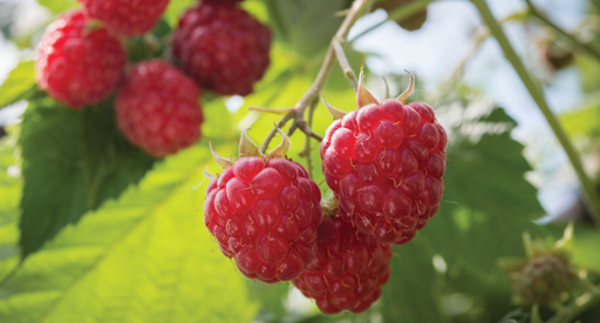
5 Steps to Raspberry Planting Success
- Choose a spot in full sun and away from strong winds. Support raspberries with stakes or a trellis.
- Prepare your soil with organic matter like sheep pellets and compost.
- Add a layer of strawberry mix to plant into. Raspberries can be planted from autumn through to spring in New Zealand.
- Feed raspberries in autumn and spring with strawberry food.
- Water raspberries regularly and mulch to conserve moisture during the fruiting season.
Follow our full guide below to a bumper crop of homegrown raspberries.
Sweet juicy raspberries are simply delicious and easy to grow at home. Create a berry patch full of bright, colourful berries with our simple guide below.
Prepare
Raspberries are an ideal home plant for most temperature areas of New Zealand.
Two main types of raspberry plant are commonly grown: summer-fruiting and autumn-fruiting. Summer-fruiting varieties fruit on the previous years stems or canes, while autumn-fruiting plants produce fruit on the current seasons growth.
Early or mid-season ripening fruit varieties are usually the best bet to avoid berries coming on in the beginning of winter.
To ensure success, it is best to buy plants from a garden centre to establish the desirable characteristics.
Plant
Berries require a position in full sun to thrive - no sun equals little or no flavour. Like other berries, raspberries will do best in areas that have cold weather through the winter.
Raspberries are a tall plant so choose an area in your garden away from strong winds, up against a fence on a north facing wall is a good option. A simple tee pee or pyramid system made from 3-5 straight branches is effective. Stakes, bamboo canes and trellis can be used as well.
The better the soil, the better your berries will grow. If you are starting with an existing garden bed dig in organic matter like Tui Sheep Pellets and Tui Compost to your soil. Then you can add a layer of Tui Strawberry Mix, a high quality planting mix containing the right blend of nutrients to provide your berries with the best possible start and sustained growth throughout the season. Check plant labels for individual planting instructions. If planting in pots and containers, fill with Tui Strawberry Mix.
The best times to plant are early in the morning or late in the day, so the plants aren’t exposed to the hot sun straight away.
If you are planting more than one plant, we recommend spacing of approximately 60cm between each plant.
Planting in garden beds
- Water plants thoroughly before planting and allow to drain.
- Add a layer of Tui Strawberry Mix to the area.
- Dig a hole, approximately twice the depth and width of the root ball of your plant.
- Gently loosen the root ball of your plant and position in the centre of the hole.
- Press soil gently around the base of the plant.
- Water your plant well and continue to water regularly.
Planting in pots and containers
- Water plants thoroughly before potting and allow to drain.
- Half fill your container with Tui Strawberry Mix.
- Gently take the plant from the current container, loosen the root ball and remove any loose or dead plant material and roots.
- Position your plant in the new container and fill with Tui Strawberry Mix up to 3cm from the top.
- Gently firm the mix around the base of the plant.
- The mix should be at the same level on the plant as it was in the previous container.
- Water your plant well and continue to water regularly.
Nourish
Feed your berries and they will feed you. Plants use nutrients from the soil as they grow, so replenishing the nutrients ensures your plants grow to their full potential.
Fertilise raspberries in garden beds with Tui Strawberry Food in spring and autumn.
For supercharged feeding with quick visible results try Tui Strawberry Liquid Superfood - perfect for all berry plants in garden beds, pots and containers. Boosted with nutrients and seaweed, this powerful liquid promotes healthy plant and root growth, with increased resilience to frost, heat, pests and disease.
Keep your raspberries well watered through the fruiting season to keep the fruit nice and plump. Regular watering is a must even after fruiting has finished. Well watered, well nourished raspberries will have a better chance of keeping insect pests and diseases at bay. Mulching with Tui Pea Straw is also important during the warm weather to conserve moisture and control weeds.
Rust on raspberries
Occasionally rust (yellow/orange spots on the leaves), can affect raspberries. Follow our advice here to control rust on your raspberry bushes.
Prune in winter to remove all wood, keeping 6-8 new seasons canes for the current season’s crop.
Birds love juicy raspberries, to avoid them stealing yours, put up netting to protect your raspberries once they start fruiting.
It pays to take good care of a raspberry bush, as the best brambles can survive in a garden for 20 years or more. Think how many ruby-red jars of jam that will make!